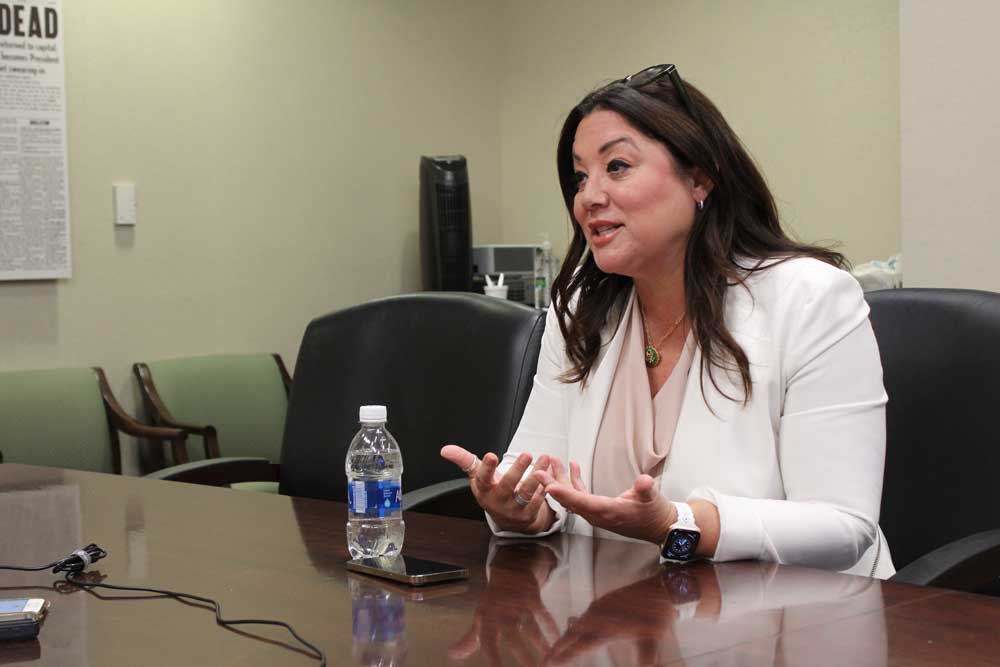Guest Column: Strengthening our communities: The importance of improving child care accessibility and affordability
Published 9:00 pm Wednesday, March 27, 2024

- U.S. Rep. Lori Chavez-DeRemer, R-Happy Valley, speaks with reporters at The Bulletin in September.
I first got involved in local government because community is more than just a word to me; it embodies the important sense of connection and belonging that ultimately helps set us up for success. When my husband and I decided Happy Valley was the place we were going to settle down and raise our twin daughters, I wanted to be involved in the decision-making process to ensure they grew up in a strong community.
I use this perspective on family and community to guide me and my priorities as the 5th District’s voice in Congress. That’s why I’ve focused on pragmatic policies to improve child care accessibility and affordability. From economic impacts to educational outcomes, child care is a fundamental pillar of our communities — a pillar that is unfortunately on shaky ground.
Trending
The Economic Policy Institute reports that the cost of care for one infant takes up 22% of an average Oregon family’s income. That number soars to nearly 40% for a family of four. These are more than just statistics. Unaffordable child care is a harsh reality for many parents that has significant, far-reaching consequences in our communities.
In a recent survey of Oregon parents, over 40% responded that they had to change career plans because they couldn’t find child care. Labor shortages are already making day-to-day operations difficult for many businesses, and the problem is only exacerbated by parents having to stay at home due to soaring child care costs. In addition to adverse workforce impacts, child care roadblocks lead to educational concerns. Children end up with less exposure to social interactions and early learning opportunities. Parents decide against pursuing higher education, which could lead to a less skilled workforce.
As a mom, I have empathy for parents concerned about finding affordable and high-quality care for their children. We all want what’s best for our kids, but moms and dads shouldn’t have to choose between staying at home full-time and working or going to school. I’m dedicated to reaching across the aisle and working on policies to address this issue.
Last summer, I teamed up with Congressman Salud Carbajal from California to introduce the Child Care Investment Act. It specifically includes enhancements to two existing tax incentives to help families offset child care expenses, including the Child and Dependent Care Tax Credit and tax-exempt Dependent Care Flexible Spending Accounts. Additionally, our proposal expands the Employer-Provided Child Care Credit to help businesses offer more child care options directly to their employees. The Child Care Investment Act has been endorsed by the U.S. Chamber of Commerce and by my colleagues on the Problem Solvers Caucus.
Similarly, in the bipartisan appropriations package that was just signed into law, I helped increase funding for the Child Care and Development Block Grants by $725 million. This additional funding will ensure more low-income families can pay for child care so they can keep working or pursue a degree to advance their careers. The House has also passed bipartisan legislation, known as the Tax Relief for American Families and Workers Act, which supports working families with an enhanced child tax credit — allowing parents to keep more of their hard-earned money to pay for things like child care, groceries, and other necessities. Importantly, it provides relief from climbing prices by adjusting the child tax credit to inflation.
However, affordability doesn’t matter if waitlists are so long that child care isn’t accessible. That’s why I’ve also helped introduce H.R. 7355, which is a bipartisan proposal that would expand access to early childhood education programs to eventually establish more child care services.
Trending
Investing in child care is also an investment in the future growth and success of our communities. I’ll continue working hard to ensure every family has the support they need to find high-quality, affordable care for their children.
Do you have a point you’d like to make or an issue you feel strongly about? Submit a letter to the editor or a guest column.








